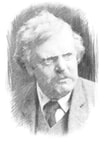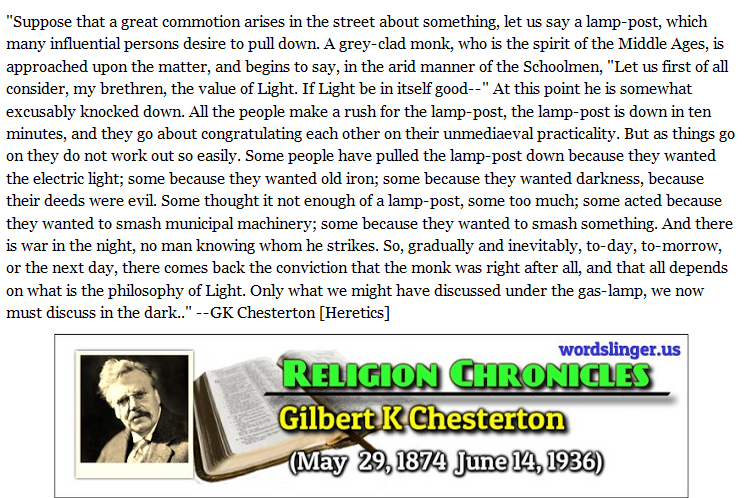GK Chesterton
Gilbert Keith Chesterton (29 May 1874 – 14 June 1936) was an English writer, philosopher, Christian apologist, a literary and art critic. Chesterton created the fictional priest-detective Father Brown, and wrote on apologetics. Even some of those who disagree with him have recognized the wide appeal of such works as Orthodoxy and The Everlasting Man. Chesterton routinely referred to himself as an orthodox Christian, and came to identify this position more and more with Catholicism, eventually converting to Roman Catholicism from high church Anglicanism. Biographers have identified him as a successor to such Victorian authors as Matthew Arnold, Thomas Carlyle, John Henry Newman and John Ruskin. Chesterton's first published books were of poetry. Boyd points to a "close connection between his poetry and his everyday journalism," concluding: "In this sense, T.S. Eliot's description of Chesterton's poetry as 'first-rate journalistic balladry' turns out to have been particularly perceptive, since it is a reminder about the essential character of all Chesterton's work. In his verse, as in all his writings, his first aim was to comment on the political and social questions of the day."
Unholy alliance
Christian nationalism is as old as Constantine and as new as MAGA. From the Roman emperor to the Trump slogan, the merging of religious and national identities has taken many forms. In “a nation with the soul of a church,” as G.K. Chesterton once called the United States, Christian nationalism is rising — partly because Chesterton’s description is less true today, prompting attempts to impose minority views on an increasingly secular society. “The frequency of violent acts inspired by Christian nationalism and a resurgence in attempts to legislate and govern from a position of Christian nationalism has been on a dramatic uptick,” said Amanda Tyler, executive director of the Baptist Joint Committee for Religious Liberty, in 2021.
(Paul Schrag/Anabaptist World 8/21/23)
READ MORE>>>>
Christian nationalism is as old as Constantine and as new as MAGA. From the Roman emperor to the Trump slogan, the merging of religious and national identities has taken many forms. In “a nation with the soul of a church,” as G.K. Chesterton once called the United States, Christian nationalism is rising — partly because Chesterton’s description is less true today, prompting attempts to impose minority views on an increasingly secular society. “The frequency of violent acts inspired by Christian nationalism and a resurgence in attempts to legislate and govern from a position of Christian nationalism has been on a dramatic uptick,” said Amanda Tyler, executive director of the Baptist Joint Committee for Religious Liberty, in 2021.
(Paul Schrag/Anabaptist World 8/21/23)
READ MORE>>>>
“Without education, we are in a horrible and deadly danger of taking educated people seriously.”
― G.K. Chesterton
― G.K. Chesterton
 GK Chesterton
GK Chesterton
“The modern mind will accept nothing on authority, but will accept anything on no authority. Say that the Bible or the Pope says so and it will be dismissed without further examination. But preface your remark with ‘I think I heard somewhere,’ or, try but fail to remember the name of some professor who might have said ‘such-and-such,’ and it will be immediately accepted as an unshakable fact.” --G.K. Chesterton
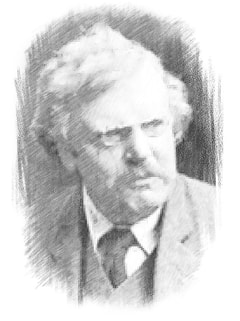 GK Chesterton
GK Chesterton
"My country, right or wrong," is a thing that no patriot would think of saying except in a desperate case. It is like saying, "My mother, drunk or sober." -G. K. Chesterton
Journalism largely consists of saying 'Lord Jones is Dead' to people who never knew that Lord Jones was alive. --G. K. Chesterton
“The Christian ideal has not been tried and found wanting. It has been found difficult; and left untried.” ― G.K. Chesterton, What's Wrong with the World
“The true soldier fights not because he hates what is in front of him, but because he loves what is behind him.”
― G.K. Chesterton
“Without education, we are in a horrible and deadly danger of taking educated people seriously.”
― G.K. Chesterton
Journalism largely consists of saying 'Lord Jones is Dead' to people who never knew that Lord Jones was alive. --G. K. Chesterton
“The Christian ideal has not been tried and found wanting. It has been found difficult; and left untried.” ― G.K. Chesterton, What's Wrong with the World
“The true soldier fights not because he hates what is in front of him, but because he loves what is behind him.”
― G.K. Chesterton
“Without education, we are in a horrible and deadly danger of taking educated people seriously.”
― G.K. Chesterton
Aug 11, 2021: Caffeinated Thoughts: Dealing With Doubt
G.K. Chesterton in 1959 work Orthodoxy said what we suffer from “is humility in the wrong place. Modesty has moved from the organ of ambition… (and) settled upon the organ of conviction, where it was never meant to be. A man was meant to be doubtful about himself, but undoubting about the truth; this has been exactly reversed. We are on the road to producing a race of men too mentally modest to believe in the multiplication table.”
G.K. Chesterton in 1959 work Orthodoxy said what we suffer from “is humility in the wrong place. Modesty has moved from the organ of ambition… (and) settled upon the organ of conviction, where it was never meant to be. A man was meant to be doubtful about himself, but undoubting about the truth; this has been exactly reversed. We are on the road to producing a race of men too mentally modest to believe in the multiplication table.”
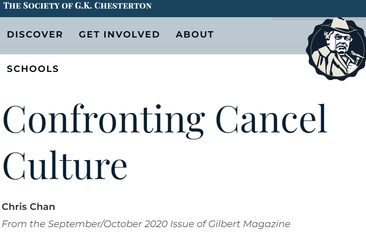
The purpose of debate ought not to be to crush or humiliate, for the ultimate goal of crafting a genuine argument is to convince rather than destroy. If “cancel culture” wrecks someone’s life, people may have advanced their cause, or have they? And what has been lost in the process? Freedom to interact, courage to express oneself, encouragement to think, and motivation to go against the flow are sacrificed.
To those who may believe that some people deserve to be removed from the public sphere, or for those who despair over the current state of public discourse, I shall conclude with Chesterton’s insights: “Charity means pardoning the unpardonable … Hope means hoping when things are hopeless … And Faith means believing the incredible.” Adding to that, if we are to popularize Chesterton’s approach to debate and controversy to the public sphere, we must be prepared to build bridges where the ground seems too unstable to support the weight of a unifying structure, and we must also be prepared to stand by those opinions that we believe to be true, even in the wake of a firestorm of criticism. -Chris Chan; Gilbert Magazine Oct 2020
To those who may believe that some people deserve to be removed from the public sphere, or for those who despair over the current state of public discourse, I shall conclude with Chesterton’s insights: “Charity means pardoning the unpardonable … Hope means hoping when things are hopeless … And Faith means believing the incredible.” Adding to that, if we are to popularize Chesterton’s approach to debate and controversy to the public sphere, we must be prepared to build bridges where the ground seems too unstable to support the weight of a unifying structure, and we must also be prepared to stand by those opinions that we believe to be true, even in the wake of a firestorm of criticism. -Chris Chan; Gilbert Magazine Oct 2020
Sept 3, 2020: Foundation for Economic Education: Americans Could Learn a Lot from the Friendship of H.G. Wells and G.K. Chesterton
One was an atheistic socialist; the other a faith-based conservative. One was a science-fiction novelist and historian; one a columnist, poet, and mystery novelist
One was an atheistic socialist; the other a faith-based conservative. One was a science-fiction novelist and historian; one a columnist, poet, and mystery novelist
 Gary Wills
Gary Wills
There is much in Chesterton that might commend itself to the right wing in America: his militarism, antifeminism and anti-Semitism. But, to the credit of the right wing, these are less emphasized than Chesterton’s populism, his opposition to experts and his distrust of modern science. What they like about Chesterton is what Jay P. Corrin has called "the battle against modernity" and especially against Darwin.
The most embarrassing of Chesterton’s positions, in this refashioning to evangelical tastes, is his deep and omnipresent opposition to capitalism. However eccentric himself, he shared with his beloved Samuel Johnson an opposition to the absurdity of individualism as a principle of community. He sincerely loved tradition, and rightly saw untrammeled consumerism and the glorification of the entrepreneur as destabilizing -- what Belloc called the attempt to use explosives as a social glue.
So the first task for American conservatives who want to use Chesterton is to explain away his anticapitalism. This Michael Novak attempts to do as part of the extraordinarily wrong-headed reprint series of Chesterton’s works appearing from Ignatius Press. Novak argues that what Chesterton really opposed was more monopolism, rather than the competitive principle itself (a grave misreading of Chesterton’s debt to John Ruskin). And he takes comfort from Chesterton’s opposition to socialism. Novak shows the divided nature of the right wing’s own cultural heritage when he praises Chesterton as a productive and innovative journalist and, at the same time, celebrates his "devastating criticisms of modernity."
If Chesterton were an artist or thinker on the scale of Ruskin, this opportunistic discipleship could do him little harm. But most of what Chesterton ground out in the journalistic productiveness Novak praises was formulaic trash. With a sure instinct, the right-wing celebrants behind the Ignatius Press edition have not only accepted but are highlighting the worst aspects of the man’s work. They are actually printing, with pseudo-learned footnotes, 11 volumes of his lamentable columns for the Illustrated London News (1905-1936) The terms on which Chesterton wrote this weekly column were stultifying. It had to fill one of the ILN’s large pages (1,600 words) , and he was not to deal with religion or politics. The editors rightly note that he circumvented the ban on subjects that mattered most to him, but he did it in indirect ways that gave his style the arch and trivializing tone that offends (rightly) so many.
Chesterton’s strength lay in verbal economy. No one could compress an argument into an epigram with greater precision. Forced to bloviate for over 1,000 words before or after he made his telling remark of the week (if he had one) , he resorted to rhetorical flourishes. Then, because he was a genuinely modest man, he tempered the large verbal gestures with self-deprecating exercises that helped fill the rest of the space (and became as labored as the bravado)
Though Chesterton never grew as a thinker, the statement of his central insight is always stunning, in whatever genre, before it is dulled by repetition. Thus he wrote one brilliant biblical essay (on the Book of Job) , one superb piece of Shakespeare criticism (on A Midsummer Night’s Dream) , one neglected masterpiece in narrative verse (The Ballad of the White Horse) , one great fantasy-novel (The Man Who Was Thursday) , one dark joke of a playlet (The Surprise) , one gripping short story ("The Flying Stars") , and assorted short prose passages on nightmare, myth and creativity scattered through books like those on Dickens, St. Francis and St. Thomas. Here, for instance, is his description of the crisis that broke and reforged the spirit of St. Francis:
We used to be told, in the nursery that if a man were to bore a hole through the center of the earth and climb continually down and down, there would come a moment when he would seem to be climbing up and up. . . . We cannot follow St. Francis to that final spiritual overturn in which complete humiliation becomes complete holiness or happiness, because we have never been there. . . . We have never gone up like that because we have never gone down like that. . . . The symbol of inversion is true in another way. If a man saw the world upside down, with all the trees and towers, hanging head downwards as in a pool, one effect would be to emphasize the idea of dependence. There is a Latin and literal connection; for the very word dependence only means hanging. It would make vivid the Scriptural text which says that God has hung the world upon nothing. . . . The mystic who passes through the moment when there is nothing but God does in some sense behold the beginningless beginnings in which there was really nothing else. He not only appreciates everything but the nothing of which everything was made. In a fashion he endures and answers even the earthquake irony of the Book of Job; in some sense he is there when the foundations of the world are laid, with the morning stars singing together and the sons of God shouting for joy.
Those are the words of a great spiritual writer, no matter what use people make of his tawdrier work.
--Gary Wills; Christian Century, May 16-23, 1990 pp.532-533
The most embarrassing of Chesterton’s positions, in this refashioning to evangelical tastes, is his deep and omnipresent opposition to capitalism. However eccentric himself, he shared with his beloved Samuel Johnson an opposition to the absurdity of individualism as a principle of community. He sincerely loved tradition, and rightly saw untrammeled consumerism and the glorification of the entrepreneur as destabilizing -- what Belloc called the attempt to use explosives as a social glue.
So the first task for American conservatives who want to use Chesterton is to explain away his anticapitalism. This Michael Novak attempts to do as part of the extraordinarily wrong-headed reprint series of Chesterton’s works appearing from Ignatius Press. Novak argues that what Chesterton really opposed was more monopolism, rather than the competitive principle itself (a grave misreading of Chesterton’s debt to John Ruskin). And he takes comfort from Chesterton’s opposition to socialism. Novak shows the divided nature of the right wing’s own cultural heritage when he praises Chesterton as a productive and innovative journalist and, at the same time, celebrates his "devastating criticisms of modernity."
If Chesterton were an artist or thinker on the scale of Ruskin, this opportunistic discipleship could do him little harm. But most of what Chesterton ground out in the journalistic productiveness Novak praises was formulaic trash. With a sure instinct, the right-wing celebrants behind the Ignatius Press edition have not only accepted but are highlighting the worst aspects of the man’s work. They are actually printing, with pseudo-learned footnotes, 11 volumes of his lamentable columns for the Illustrated London News (1905-1936) The terms on which Chesterton wrote this weekly column were stultifying. It had to fill one of the ILN’s large pages (1,600 words) , and he was not to deal with religion or politics. The editors rightly note that he circumvented the ban on subjects that mattered most to him, but he did it in indirect ways that gave his style the arch and trivializing tone that offends (rightly) so many.
Chesterton’s strength lay in verbal economy. No one could compress an argument into an epigram with greater precision. Forced to bloviate for over 1,000 words before or after he made his telling remark of the week (if he had one) , he resorted to rhetorical flourishes. Then, because he was a genuinely modest man, he tempered the large verbal gestures with self-deprecating exercises that helped fill the rest of the space (and became as labored as the bravado)
Though Chesterton never grew as a thinker, the statement of his central insight is always stunning, in whatever genre, before it is dulled by repetition. Thus he wrote one brilliant biblical essay (on the Book of Job) , one superb piece of Shakespeare criticism (on A Midsummer Night’s Dream) , one neglected masterpiece in narrative verse (The Ballad of the White Horse) , one great fantasy-novel (The Man Who Was Thursday) , one dark joke of a playlet (The Surprise) , one gripping short story ("The Flying Stars") , and assorted short prose passages on nightmare, myth and creativity scattered through books like those on Dickens, St. Francis and St. Thomas. Here, for instance, is his description of the crisis that broke and reforged the spirit of St. Francis:
We used to be told, in the nursery that if a man were to bore a hole through the center of the earth and climb continually down and down, there would come a moment when he would seem to be climbing up and up. . . . We cannot follow St. Francis to that final spiritual overturn in which complete humiliation becomes complete holiness or happiness, because we have never been there. . . . We have never gone up like that because we have never gone down like that. . . . The symbol of inversion is true in another way. If a man saw the world upside down, with all the trees and towers, hanging head downwards as in a pool, one effect would be to emphasize the idea of dependence. There is a Latin and literal connection; for the very word dependence only means hanging. It would make vivid the Scriptural text which says that God has hung the world upon nothing. . . . The mystic who passes through the moment when there is nothing but God does in some sense behold the beginningless beginnings in which there was really nothing else. He not only appreciates everything but the nothing of which everything was made. In a fashion he endures and answers even the earthquake irony of the Book of Job; in some sense he is there when the foundations of the world are laid, with the morning stars singing together and the sons of God shouting for joy.
Those are the words of a great spiritual writer, no matter what use people make of his tawdrier work.
--Gary Wills; Christian Century, May 16-23, 1990 pp.532-533
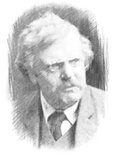 GK Chesterton
GK Chesterton
“The best reason for a revivial of philosophy is that unless a man has a philosophy certain horrible things will happen to him ... struck down by blow after blow of blind stupidity and random fate, he will stagger on to a miserable death with no comfort but a series of catchwords.”
-G.K. Chesterton; “The Revival of Philosophy — Why”


